Emotional Intelligence for Effective Management
VerifiedAdded on 2020/03/16
|7
|1474
|36
AI Summary
This assignment delves into the significance of emotional intelligence (EI) for aspiring managers. It emphasizes how self-awareness activities, positive behavior, and understanding others' attitudes contribute to effective leadership. The document highlights the practical implications of EI, including improved communication, motivation, and achievement of both personal and organizational goals. It argues that embracing EI principles leads to more successful and fulfilling management experiences.
Contribute Materials
Your contribution can guide someone’s learning journey. Share your
documents today.
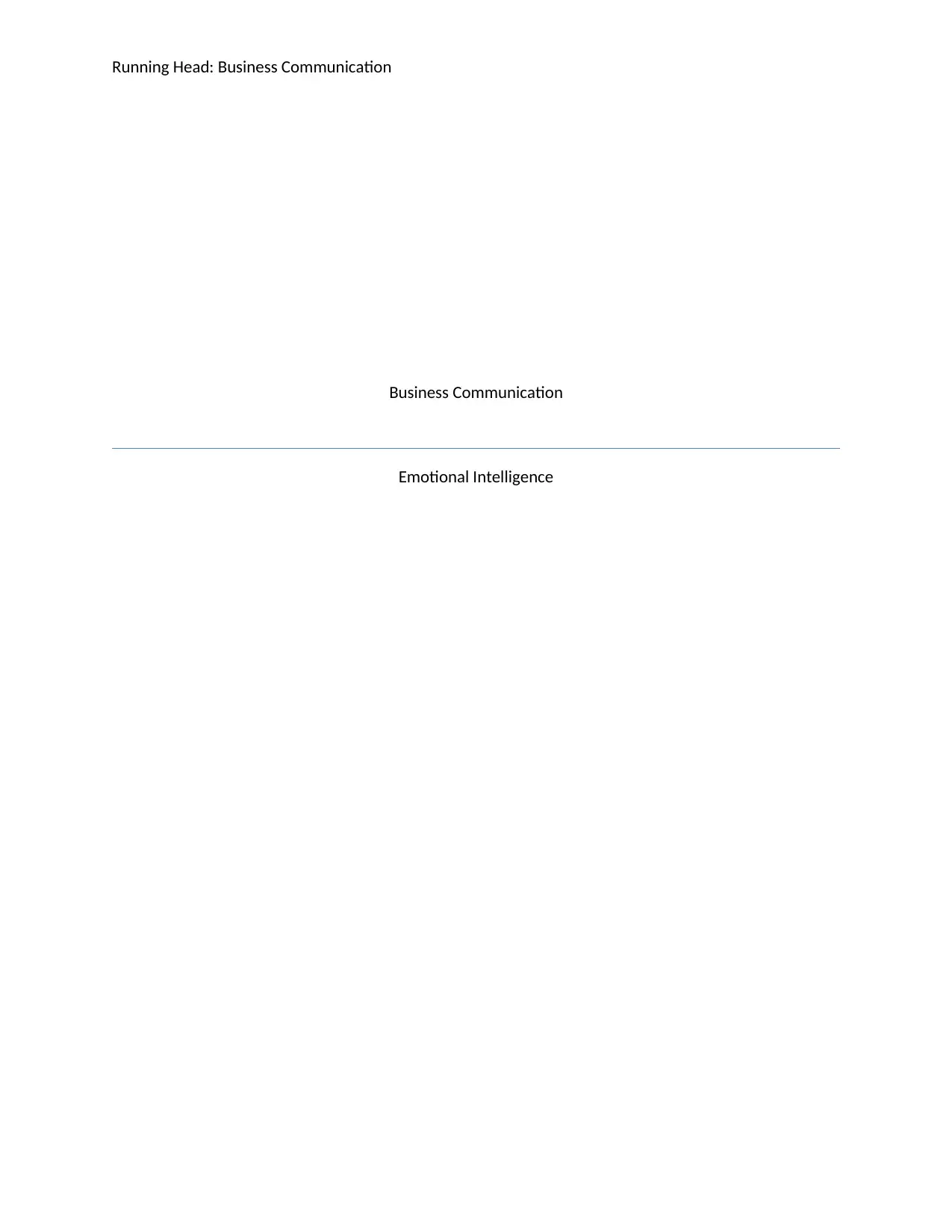
Running Head: Business Communication
Business Communication
Emotional Intelligence
Business Communication
Emotional Intelligence
Secure Best Marks with AI Grader
Need help grading? Try our AI Grader for instant feedback on your assignments.
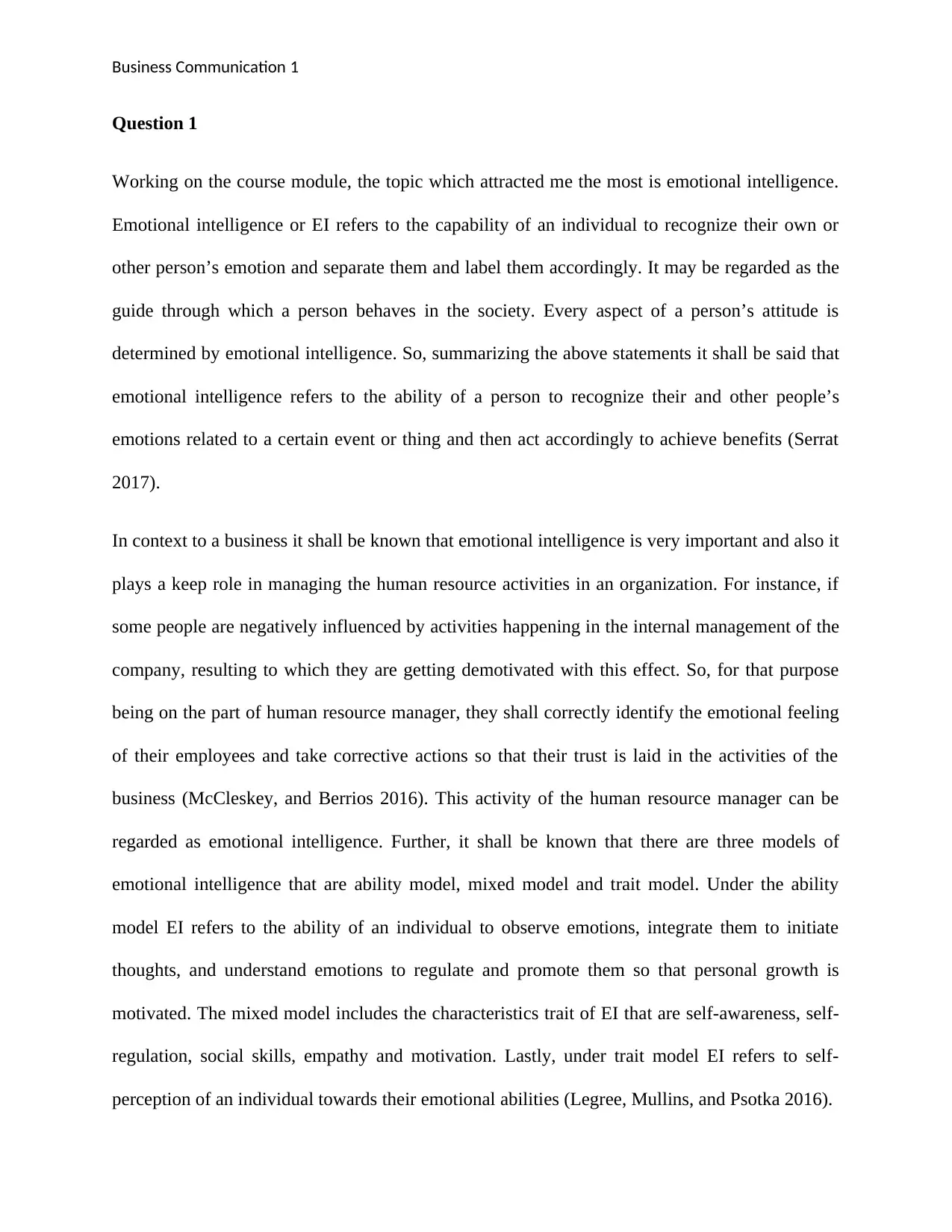
Business Communication 1
Question 1
Working on the course module, the topic which attracted me the most is emotional intelligence.
Emotional intelligence or EI refers to the capability of an individual to recognize their own or
other person’s emotion and separate them and label them accordingly. It may be regarded as the
guide through which a person behaves in the society. Every aspect of a person’s attitude is
determined by emotional intelligence. So, summarizing the above statements it shall be said that
emotional intelligence refers to the ability of a person to recognize their and other people’s
emotions related to a certain event or thing and then act accordingly to achieve benefits (Serrat
2017).
In context to a business it shall be known that emotional intelligence is very important and also it
plays a keep role in managing the human resource activities in an organization. For instance, if
some people are negatively influenced by activities happening in the internal management of the
company, resulting to which they are getting demotivated with this effect. So, for that purpose
being on the part of human resource manager, they shall correctly identify the emotional feeling
of their employees and take corrective actions so that their trust is laid in the activities of the
business (McCleskey, and Berrios 2016). This activity of the human resource manager can be
regarded as emotional intelligence. Further, it shall be known that there are three models of
emotional intelligence that are ability model, mixed model and trait model. Under the ability
model EI refers to the ability of an individual to observe emotions, integrate them to initiate
thoughts, and understand emotions to regulate and promote them so that personal growth is
motivated. The mixed model includes the characteristics trait of EI that are self-awareness, self-
regulation, social skills, empathy and motivation. Lastly, under trait model EI refers to self-
perception of an individual towards their emotional abilities (Legree, Mullins, and Psotka 2016).
Question 1
Working on the course module, the topic which attracted me the most is emotional intelligence.
Emotional intelligence or EI refers to the capability of an individual to recognize their own or
other person’s emotion and separate them and label them accordingly. It may be regarded as the
guide through which a person behaves in the society. Every aspect of a person’s attitude is
determined by emotional intelligence. So, summarizing the above statements it shall be said that
emotional intelligence refers to the ability of a person to recognize their and other people’s
emotions related to a certain event or thing and then act accordingly to achieve benefits (Serrat
2017).
In context to a business it shall be known that emotional intelligence is very important and also it
plays a keep role in managing the human resource activities in an organization. For instance, if
some people are negatively influenced by activities happening in the internal management of the
company, resulting to which they are getting demotivated with this effect. So, for that purpose
being on the part of human resource manager, they shall correctly identify the emotional feeling
of their employees and take corrective actions so that their trust is laid in the activities of the
business (McCleskey, and Berrios 2016). This activity of the human resource manager can be
regarded as emotional intelligence. Further, it shall be known that there are three models of
emotional intelligence that are ability model, mixed model and trait model. Under the ability
model EI refers to the ability of an individual to observe emotions, integrate them to initiate
thoughts, and understand emotions to regulate and promote them so that personal growth is
motivated. The mixed model includes the characteristics trait of EI that are self-awareness, self-
regulation, social skills, empathy and motivation. Lastly, under trait model EI refers to self-
perception of an individual towards their emotional abilities (Legree, Mullins, and Psotka 2016).
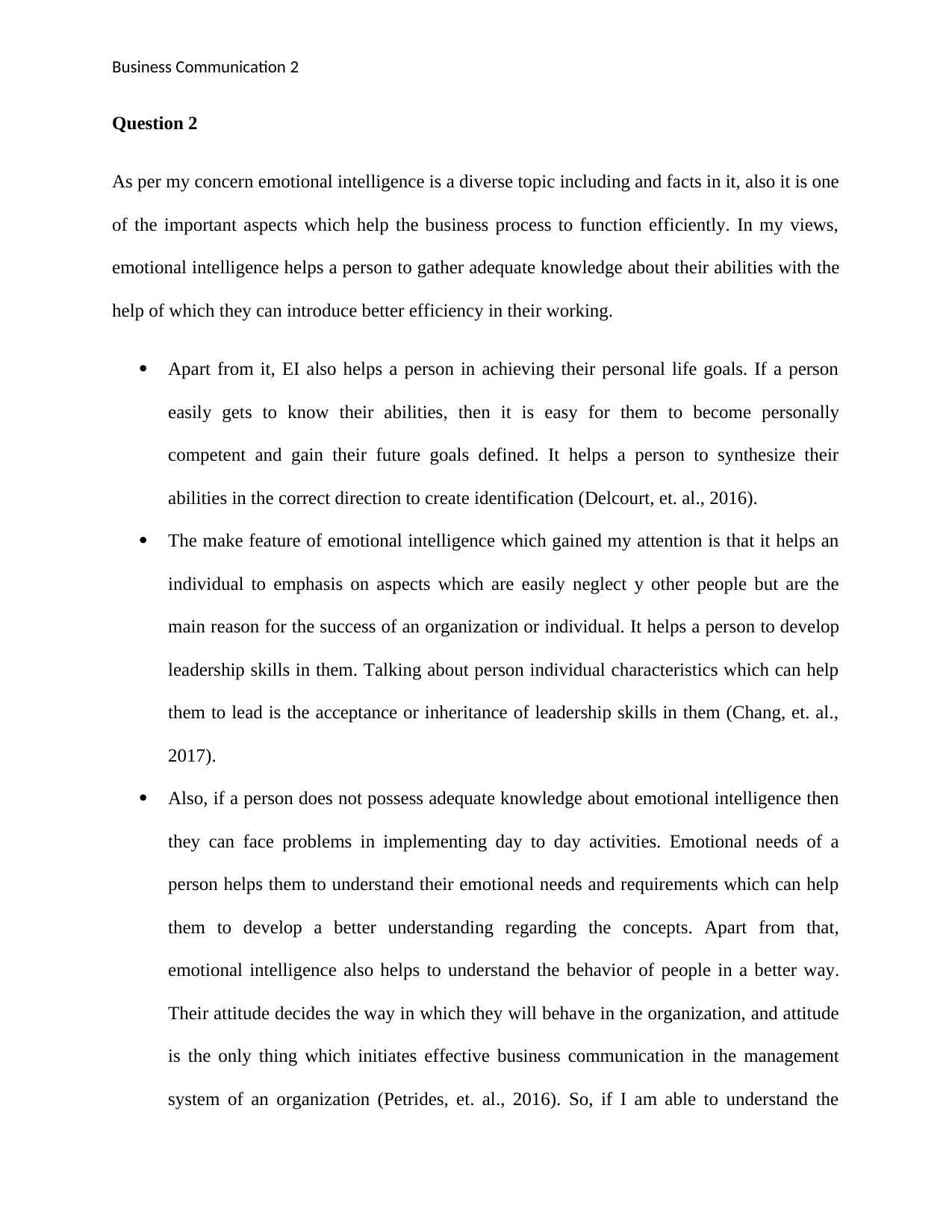
Business Communication 2
Question 2
As per my concern emotional intelligence is a diverse topic including and facts in it, also it is one
of the important aspects which help the business process to function efficiently. In my views,
emotional intelligence helps a person to gather adequate knowledge about their abilities with the
help of which they can introduce better efficiency in their working.
Apart from it, EI also helps a person in achieving their personal life goals. If a person
easily gets to know their abilities, then it is easy for them to become personally
competent and gain their future goals defined. It helps a person to synthesize their
abilities in the correct direction to create identification (Delcourt, et. al., 2016).
The make feature of emotional intelligence which gained my attention is that it helps an
individual to emphasis on aspects which are easily neglect y other people but are the
main reason for the success of an organization or individual. It helps a person to develop
leadership skills in them. Talking about person individual characteristics which can help
them to lead is the acceptance or inheritance of leadership skills in them (Chang, et. al.,
2017).
Also, if a person does not possess adequate knowledge about emotional intelligence then
they can face problems in implementing day to day activities. Emotional needs of a
person helps them to understand their emotional needs and requirements which can help
them to develop a better understanding regarding the concepts. Apart from that,
emotional intelligence also helps to understand the behavior of people in a better way.
Their attitude decides the way in which they will behave in the organization, and attitude
is the only thing which initiates effective business communication in the management
system of an organization (Petrides, et. al., 2016). So, if I am able to understand the
Question 2
As per my concern emotional intelligence is a diverse topic including and facts in it, also it is one
of the important aspects which help the business process to function efficiently. In my views,
emotional intelligence helps a person to gather adequate knowledge about their abilities with the
help of which they can introduce better efficiency in their working.
Apart from it, EI also helps a person in achieving their personal life goals. If a person
easily gets to know their abilities, then it is easy for them to become personally
competent and gain their future goals defined. It helps a person to synthesize their
abilities in the correct direction to create identification (Delcourt, et. al., 2016).
The make feature of emotional intelligence which gained my attention is that it helps an
individual to emphasis on aspects which are easily neglect y other people but are the
main reason for the success of an organization or individual. It helps a person to develop
leadership skills in them. Talking about person individual characteristics which can help
them to lead is the acceptance or inheritance of leadership skills in them (Chang, et. al.,
2017).
Also, if a person does not possess adequate knowledge about emotional intelligence then
they can face problems in implementing day to day activities. Emotional needs of a
person helps them to understand their emotional needs and requirements which can help
them to develop a better understanding regarding the concepts. Apart from that,
emotional intelligence also helps to understand the behavior of people in a better way.
Their attitude decides the way in which they will behave in the organization, and attitude
is the only thing which initiates effective business communication in the management
system of an organization (Petrides, et. al., 2016). So, if I am able to understand the
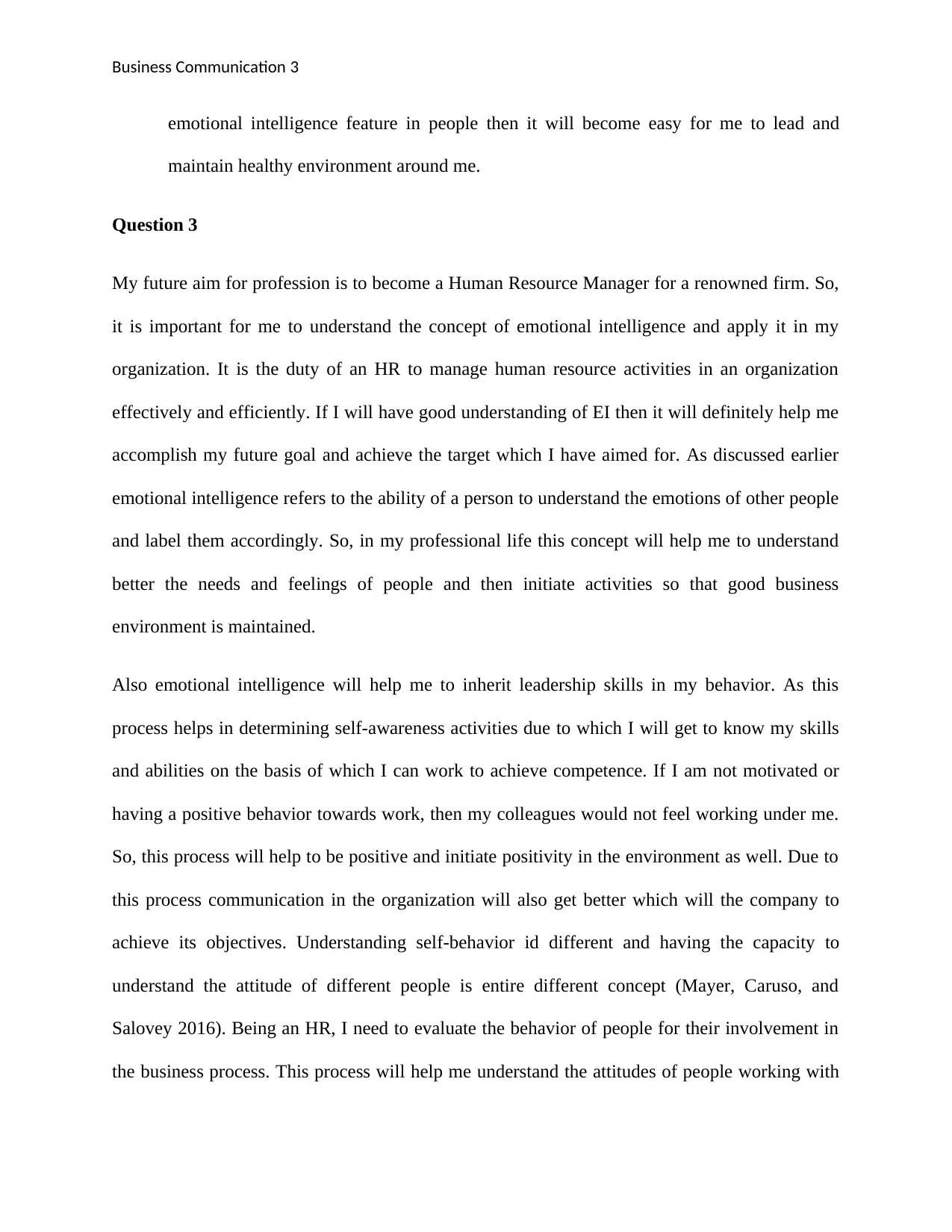
Business Communication 3
emotional intelligence feature in people then it will become easy for me to lead and
maintain healthy environment around me.
Question 3
My future aim for profession is to become a Human Resource Manager for a renowned firm. So,
it is important for me to understand the concept of emotional intelligence and apply it in my
organization. It is the duty of an HR to manage human resource activities in an organization
effectively and efficiently. If I will have good understanding of EI then it will definitely help me
accomplish my future goal and achieve the target which I have aimed for. As discussed earlier
emotional intelligence refers to the ability of a person to understand the emotions of other people
and label them accordingly. So, in my professional life this concept will help me to understand
better the needs and feelings of people and then initiate activities so that good business
environment is maintained.
Also emotional intelligence will help me to inherit leadership skills in my behavior. As this
process helps in determining self-awareness activities due to which I will get to know my skills
and abilities on the basis of which I can work to achieve competence. If I am not motivated or
having a positive behavior towards work, then my colleagues would not feel working under me.
So, this process will help to be positive and initiate positivity in the environment as well. Due to
this process communication in the organization will also get better which will the company to
achieve its objectives. Understanding self-behavior id different and having the capacity to
understand the attitude of different people is entire different concept (Mayer, Caruso, and
Salovey 2016). Being an HR, I need to evaluate the behavior of people for their involvement in
the business process. This process will help me understand the attitudes of people working with
emotional intelligence feature in people then it will become easy for me to lead and
maintain healthy environment around me.
Question 3
My future aim for profession is to become a Human Resource Manager for a renowned firm. So,
it is important for me to understand the concept of emotional intelligence and apply it in my
organization. It is the duty of an HR to manage human resource activities in an organization
effectively and efficiently. If I will have good understanding of EI then it will definitely help me
accomplish my future goal and achieve the target which I have aimed for. As discussed earlier
emotional intelligence refers to the ability of a person to understand the emotions of other people
and label them accordingly. So, in my professional life this concept will help me to understand
better the needs and feelings of people and then initiate activities so that good business
environment is maintained.
Also emotional intelligence will help me to inherit leadership skills in my behavior. As this
process helps in determining self-awareness activities due to which I will get to know my skills
and abilities on the basis of which I can work to achieve competence. If I am not motivated or
having a positive behavior towards work, then my colleagues would not feel working under me.
So, this process will help to be positive and initiate positivity in the environment as well. Due to
this process communication in the organization will also get better which will the company to
achieve its objectives. Understanding self-behavior id different and having the capacity to
understand the attitude of different people is entire different concept (Mayer, Caruso, and
Salovey 2016). Being an HR, I need to evaluate the behavior of people for their involvement in
the business process. This process will help me understand the attitudes of people working with
Secure Best Marks with AI Grader
Need help grading? Try our AI Grader for instant feedback on your assignments.
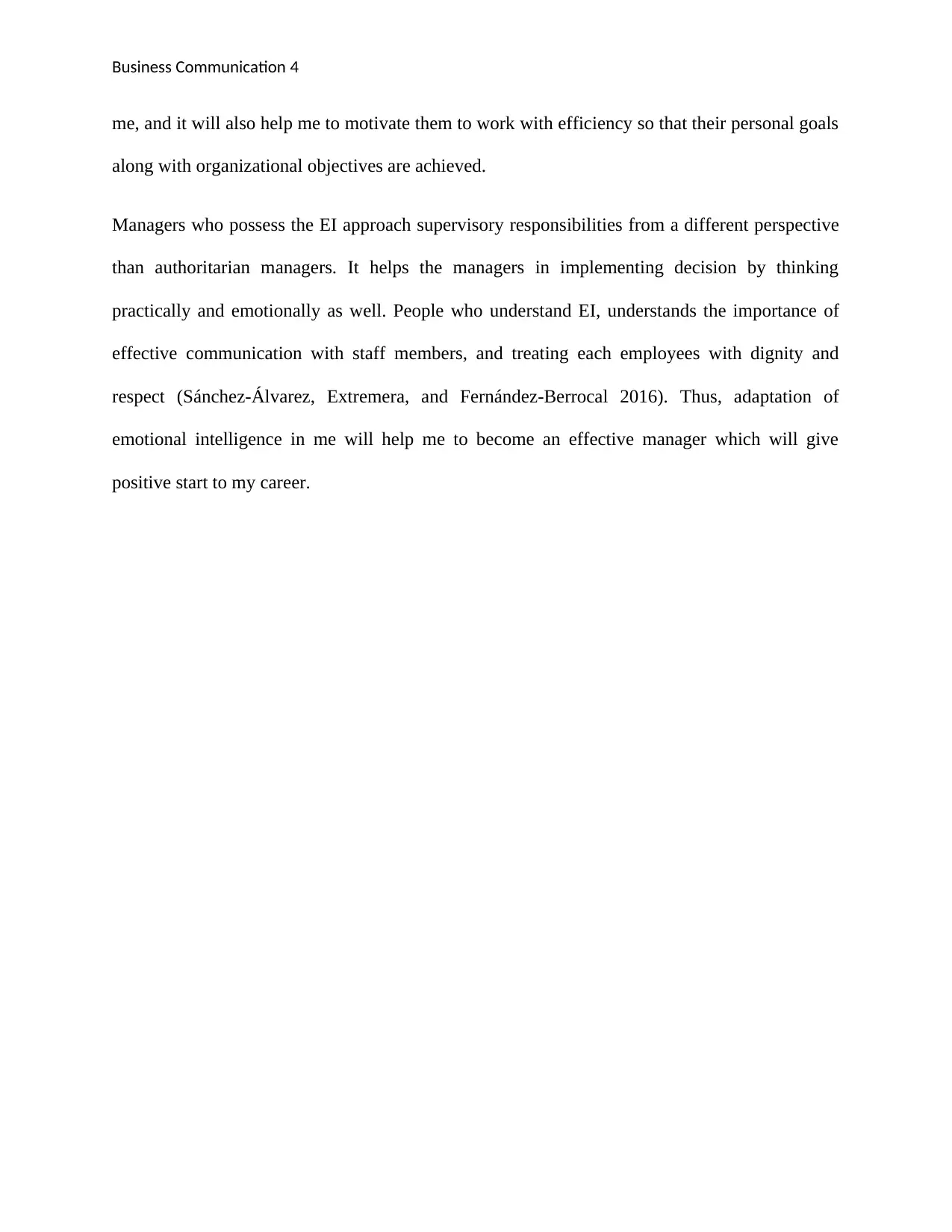
Business Communication 4
me, and it will also help me to motivate them to work with efficiency so that their personal goals
along with organizational objectives are achieved.
Managers who possess the EI approach supervisory responsibilities from a different perspective
than authoritarian managers. It helps the managers in implementing decision by thinking
practically and emotionally as well. People who understand EI, understands the importance of
effective communication with staff members, and treating each employees with dignity and
respect (Sánchez-Álvarez, Extremera, and Fernández-Berrocal 2016). Thus, adaptation of
emotional intelligence in me will help me to become an effective manager which will give
positive start to my career.
me, and it will also help me to motivate them to work with efficiency so that their personal goals
along with organizational objectives are achieved.
Managers who possess the EI approach supervisory responsibilities from a different perspective
than authoritarian managers. It helps the managers in implementing decision by thinking
practically and emotionally as well. People who understand EI, understands the importance of
effective communication with staff members, and treating each employees with dignity and
respect (Sánchez-Álvarez, Extremera, and Fernández-Berrocal 2016). Thus, adaptation of
emotional intelligence in me will help me to become an effective manager which will give
positive start to my career.
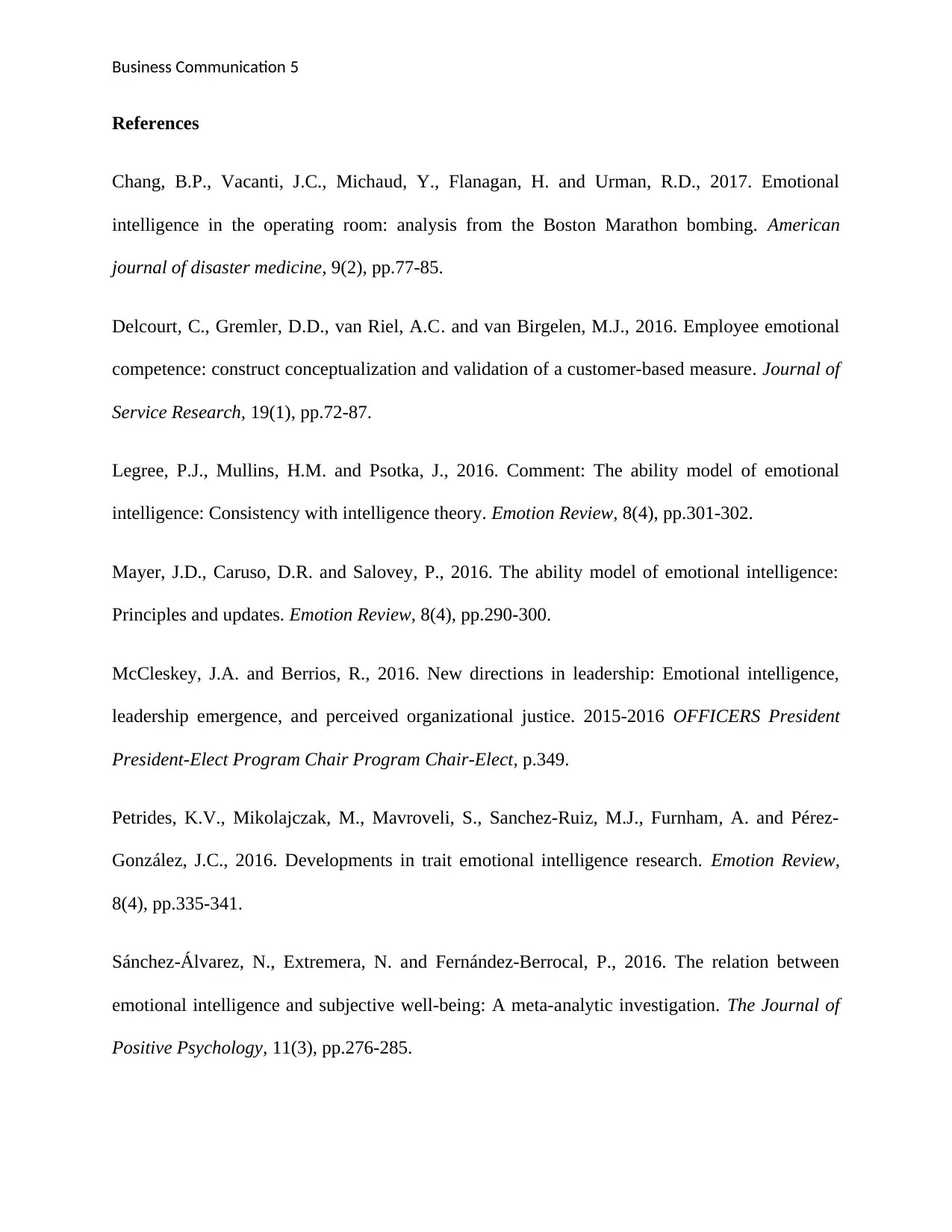
Business Communication 5
References
Chang, B.P., Vacanti, J.C., Michaud, Y., Flanagan, H. and Urman, R.D., 2017. Emotional
intelligence in the operating room: analysis from the Boston Marathon bombing. American
journal of disaster medicine, 9(2), pp.77-85.
Delcourt, C., Gremler, D.D., van Riel, A.C. and van Birgelen, M.J., 2016. Employee emotional
competence: construct conceptualization and validation of a customer-based measure. Journal of
Service Research, 19(1), pp.72-87.
Legree, P.J., Mullins, H.M. and Psotka, J., 2016. Comment: The ability model of emotional
intelligence: Consistency with intelligence theory. Emotion Review, 8(4), pp.301-302.
Mayer, J.D., Caruso, D.R. and Salovey, P., 2016. The ability model of emotional intelligence:
Principles and updates. Emotion Review, 8(4), pp.290-300.
McCleskey, J.A. and Berrios, R., 2016. New directions in leadership: Emotional intelligence,
leadership emergence, and perceived organizational justice. 2015-2016 OFFICERS President
President-Elect Program Chair Program Chair-Elect, p.349.
Petrides, K.V., Mikolajczak, M., Mavroveli, S., Sanchez-Ruiz, M.J., Furnham, A. and Pérez-
González, J.C., 2016. Developments in trait emotional intelligence research. Emotion Review,
8(4), pp.335-341.
Sánchez-Álvarez, N., Extremera, N. and Fernández-Berrocal, P., 2016. The relation between
emotional intelligence and subjective well-being: A meta-analytic investigation. The Journal of
Positive Psychology, 11(3), pp.276-285.
References
Chang, B.P., Vacanti, J.C., Michaud, Y., Flanagan, H. and Urman, R.D., 2017. Emotional
intelligence in the operating room: analysis from the Boston Marathon bombing. American
journal of disaster medicine, 9(2), pp.77-85.
Delcourt, C., Gremler, D.D., van Riel, A.C. and van Birgelen, M.J., 2016. Employee emotional
competence: construct conceptualization and validation of a customer-based measure. Journal of
Service Research, 19(1), pp.72-87.
Legree, P.J., Mullins, H.M. and Psotka, J., 2016. Comment: The ability model of emotional
intelligence: Consistency with intelligence theory. Emotion Review, 8(4), pp.301-302.
Mayer, J.D., Caruso, D.R. and Salovey, P., 2016. The ability model of emotional intelligence:
Principles and updates. Emotion Review, 8(4), pp.290-300.
McCleskey, J.A. and Berrios, R., 2016. New directions in leadership: Emotional intelligence,
leadership emergence, and perceived organizational justice. 2015-2016 OFFICERS President
President-Elect Program Chair Program Chair-Elect, p.349.
Petrides, K.V., Mikolajczak, M., Mavroveli, S., Sanchez-Ruiz, M.J., Furnham, A. and Pérez-
González, J.C., 2016. Developments in trait emotional intelligence research. Emotion Review,
8(4), pp.335-341.
Sánchez-Álvarez, N., Extremera, N. and Fernández-Berrocal, P., 2016. The relation between
emotional intelligence and subjective well-being: A meta-analytic investigation. The Journal of
Positive Psychology, 11(3), pp.276-285.

Business Communication 6
Serrat, O., 2017. Understanding and developing emotional intelligence. In Knowledge Solutions
(pp. 329-339). Springer Singapore.
Serrat, O., 2017. Understanding and developing emotional intelligence. In Knowledge Solutions
(pp. 329-339). Springer Singapore.
1 out of 7
Related Documents
Your All-in-One AI-Powered Toolkit for Academic Success.
+13062052269
info@desklib.com
Available 24*7 on WhatsApp / Email
![[object Object]](/_next/static/media/star-bottom.7253800d.svg)
Unlock your academic potential
© 2024 | Zucol Services PVT LTD | All rights reserved.





